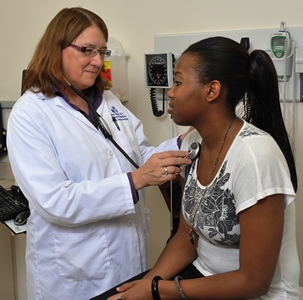NSU Newsroom
SharkBytes
Horizons
This version of NSU News has been archived as of February 28, 2019. To search through archived articles, visit nova.edu/search. To access the new version of NSU News, visit news.nova.edu.
This version of SharkBytes has been archived as of February 28, 2019. To search through archived articles, visit nova.edu/search. To access the new version of SharkBytes, visit sharkbytes.nova.edu.
NSU Research Spotlight: Chronic Fatigue Syndrome
An internationally recognized expert in immune disorders, Nancy Klimas, M.D., established the NSU College of Osteopathic Medicine’s Institute for Neuro-Immune Medicine in December 2012.
Operating from a research center and clinic on the main campus, a clinic in Miami’s Kendall neighborhood, and the Veterans Hospital in Miami, Klimas seeks to integrate research, training, and clinical care to advance the needs of patients suffering from chronic fatigue syndrome (CFS) and Gulf Warillness (GWI).
“There is so much we do not know about this illness. A cure or effective treatment is vitally needed,” says Klimas, who has served on the U.S. Health and Human Services Department CFS advisory committee through four administrations.
The two clinics serve more than 1,000 CFS patients and the Veterans Hospital serves about 300 GWI patients. While the cause of Gulf War illness remains unverified, Klimas estimates that about one-third of uniformed and civilian service members in the Gulf War in 1991 are suffering today. Many face multiple illnesses including fatigue, headaches, memory loss, and muscle and joint pain.
“Being a physician with an elaborate research program enables me to work toward understanding the underlying cause and not just treat the symptoms. I find this tremendously satisfying,” says Klimas.
Meanwhile, she has implemented a simple but effective strategy to motivate her research team—placing the research lab behind the patient waiting room. This requires everyone to walk past patients to get to their offices.
“When they [her research team] see people suffering, they think ‘Oh, man. This is important.’ Seeing what I see as a clinician has really helped the team come together,” she says.
